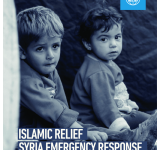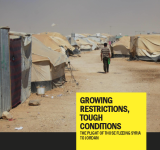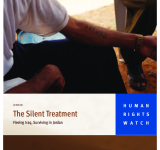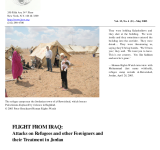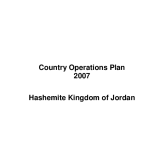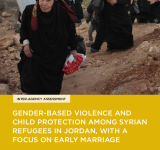refugee camp
إن هذا التقرير، الذي نشرته منظمة الإغاثة الإسلامية، يلخص بإيجاز تدخل المنظمة الإنساني للأعوام 212-214. منذ عام 212، والإغاثة الإسلامية تعمل على حماية اللاجئين السوريين والنازحين داخلياً عن طريق تلبية
يستند مضمون هذا التقرير المتعلق بالأردن إلى حد كبير إلى زيارة بحثية قامت بها منظمة العفو الدولية إلى البلاد في يونيو/حزيران 2013. وقد التقى وفد المنظمة بممثلي السلطات الأردنية ووكالات الأمم المتحدة والوكالات الإنسانية الدولية والمنظمات غير الحكومية والجمعيات الخيرية;; فضلاً عن أكثر من 150 لاجئاً من سوريا في مجتمعات اللجوء والمجتمعات المضيفة. ونشرت منظمة العفو الدولية هذا التقرير بهدف لفت الانتباه إلى الصعوبات التي يواجهها الفارون من سوريا طلباً للسلامة. وفي الوقت الذي يركز فيه التقرير بشكل رئييس على الأوضاع في الأردن;; فإنه يتضمن تحديثا للمعلومات التي كانت المنظمة قد نشرتها في السابق بشأن التحديات التي يواجهها اللالجئون من سوريا في البلدان المجاورة. وقد أمعنت منظمة العفو الدولية النظر في التحديات التي يواجهها اللاجئون في الأردن;; ولا سيما أولئك الذين يقطنون في مخيم الزعتري;; وهو أضخم مخيمات اللاجئين من سوريا في الأردن. وأجرت المنظمة تحقيقاً حول معاناة اللاجئين;; ليس من ظروف المعيشة القاسية في الصحراء فحسب;; وإنما أيضاً من ارتفاع معدلات الجريمة وغيرها من المخاوف الأمنية.
بعد الفرار من العنف والاضطهاد في العراق;; فإن مئات الآلاف من العراقيين الذين يعيشون في الأردن يواجهون تهديداً يومياً للإعتقال والغرامات والترحيل وذلك لأن الحكومة الأردنية تعاملهم معاملة المهاجرين غير الشرعيين بدلاً من معاملتهم كلاجئين. منذ بدء الحرب في العراق في عام 2003;; نزح أكثر من مليون عراقي من بلدهم طلباً للجوء من البلدان المجاورة;; إلا أنه لا يوجد أي من الدول المجاورة للعراق;; ولا الولايات المتحدة;; يعاملونهم كلاجئين. وهذا التقرير يلقي الضوء على محنة اللاجئين العراقيين (والتماس الحلول له) وهي مسؤوليةً مشتركة بين الأردن والدول المجاورة والمجتمع الدولي.
Attacks and harassment amidst the security vacuum in Iraq forced refugees and other foreigners to flee the country and become refugees again;; this time in Jordan. Based on research in Baghdad and Jordan;; this 22-page Human Rights Watch report details the abuses against refugees and foreigners in Iraq;; as well as their treatment upon arrival in Jordan. Housing is frequently the pretext for the violence and harassment. Many landlords;; forced by the previous government to take Palestinian tenants at discounted rates;; are taking advantage of the breakdown in law and order to evict Palestinian tenants from their homes or to extort unrealistic rent increases from them. In other cases;; violence and threats have come from individuals who seem to have no legitimate claim to the property. Human Rights Watch criticized Jordanian authorities for limiting refugees' entry to Jordan and recommended that Jordan provide immediate protection and assistance to all refugees;; including those currently trapped near the Jordanian border in accordance with international refugee law standards.
This document by the United Nations High Commissioner for Refugees (UNHCR) outlines Jordan operations plan for the year 2007. It stars with an overview of the operational environment including the number and characteristics of UNHCR beneficiary population;; and moves on to outlining operational goals.
The report aims to address the particular needs and cultural dynamics of Syrian refugees residing in Jordan;; especially with regards gender-based violence and child protection issues. It presents a comprehensive range of perspectives from urban Syrian refugees and local Jordanian decision makers in government;; community-based organizations and the religious and education sectors. The assessment of this report is based on data collected through three methodologies including questionnaire survey to refugees outside the Za’atari refugee camp;; focus group discussions in regions across Jordan and in-depth interviews. Key findings of the report are 1. The rates of early marriage are high;; 2. A significant percentage of children contribute to the household’s income and 3. Restrictions on women and girls’ mobility constrain their participation in social and economic activities and access to basic services. The report recommends measures to prevent acts of sexual exploitation and abuse and ensure the needs of the most vulnerable members of the Syrian refugee population in the cities.
